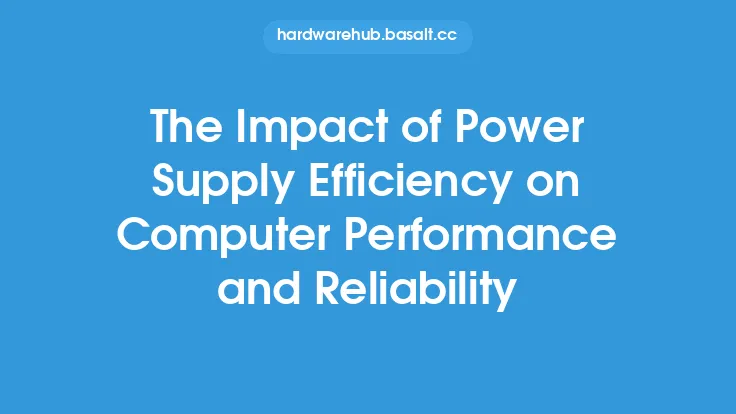When it comes to building or upgrading a computer, one of the most critical components to consider is the power supply unit (PSU). The PSU is responsible for converting AC power from the mains to DC power for the computer's components, and its quality and reliability can have a significant impact on the overall performance and lifespan of the system. With so many power supply brands available in the market, it can be challenging to choose the right one. In this article, we will delve into the world of power supply brands, comparing their quality and reliability to help you make an informed decision.
Introduction to Power Supply Units
A power supply unit (PSU) is a critical component of a computer system, responsible for providing power to all the components, including the CPU, motherboard, RAM, storage devices, and peripherals. A PSU converts AC power from the mains to DC power, which is then distributed to the various components. The quality and reliability of a PSU can affect the overall performance, stability, and lifespan of the system. A good PSU should be able to provide clean, stable power, and be able to handle the system's power requirements under various loads.
Factors Affecting Power Supply Quality and Reliability
Several factors can affect the quality and reliability of a power supply unit. These include the design and construction of the PSU, the quality of the components used, the manufacturing process, and the testing and certification procedures. Some of the key factors to consider when evaluating the quality and reliability of a PSU include:
- Efficiency: The efficiency of a PSU refers to its ability to convert AC power to DC power with minimal loss of energy. A high-efficiency PSU can help reduce power consumption, heat generation, and noise levels.
- Voltage regulation: The voltage regulation of a PSU refers to its ability to maintain a stable output voltage under various loads. A good PSU should be able to regulate the output voltage within a tight tolerance, typically ±3% or better.
- Ripple and noise: Ripple and noise refer to the AC components present in the DC output of a PSU. A good PSU should be able to minimize ripple and noise, which can affect the performance and stability of the system.
- Overcurrent protection: Overcurrent protection (OCP) is a critical feature that helps prevent damage to the PSU and the system in the event of an overload or short circuit.
- Overvoltage protection: Overvoltage protection (OVP) is another critical feature that helps prevent damage to the PSU and the system in the event of an overvoltage condition.
Comparison of Power Supply Brands
There are many power supply brands available in the market, each with its own strengths and weaknesses. Some of the top power supply brands include:
- Seasonic: Known for their high-quality and high-efficiency PSUs, Seasonic is a popular choice among computer enthusiasts and builders.
- EVGA: EVGA is a well-known brand in the computer hardware industry, and their PSUs are popular among gamers and enthusiasts.
- Corsair: Corsair is a popular brand among computer enthusiasts, and their PSUs are known for their high quality and reliability.
- Thermaltake: Thermaltake is a well-known brand in the computer hardware industry, and their PSUs are popular among gamers and enthusiasts.
- Cooler Master: Cooler Master is a popular brand among computer enthusiasts, and their PSUs are known for their high quality and reliability.
- Antec: Antec is a well-established brand in the computer hardware industry, and their PSUs are known for their high quality and reliability.
Technical Comparison of Power Supply Brands
When comparing power supply brands, it's essential to look at the technical specifications and features of each PSU. Some of the key technical specifications to consider include:
- Wattage: The wattage of a PSU refers to its maximum power output. A higher wattage PSU can handle more powerful systems, but it may also be less efficient and generate more heat.
- Efficiency: The efficiency of a PSU refers to its ability to convert AC power to DC power with minimal loss of energy. A high-efficiency PSU can help reduce power consumption, heat generation, and noise levels.
- Modularity: Modularity refers to the ability to add or remove cables from the PSU. A modular PSU can help reduce clutter and improve airflow within the system.
- Connectors: The type and number of connectors on a PSU can affect its compatibility with various systems and components.
- Certification: Look for PSUs that have been certified by reputable organizations, such as 80 PLUS, which certifies PSUs for their efficiency and performance.
Conclusion
Choosing the right power supply unit (PSU) is critical for building or upgrading a computer system. With so many power supply brands available in the market, it's essential to compare their quality and reliability to make an informed decision. By considering factors such as efficiency, voltage regulation, ripple and noise, overcurrent protection, and overvoltage protection, you can choose a PSU that meets your system's power requirements and provides clean, stable power. Additionally, looking at the technical specifications and features of each PSU, such as wattage, modularity, connectors, and certification, can help you make a more informed decision. Whether you're a computer enthusiast, a gamer, or a builder, choosing a high-quality and reliable PSU can help ensure the performance, stability, and lifespan of your system.





